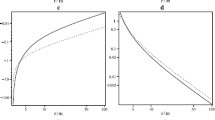Abstract
We propose a viscosity prescription in a self-gravitating system based on the self-generated gravitomagnetic field. It has been proved that the self-generated gravitomagnetic field with very low frequency is modulational unstable, leading to a self-collapse, and resulting in the enhancement of perturbed matter density and gravitomagnetic field in a small region; the interactions between highly spatially intermittent gravitomagnetic structures and the macrofluid with differential rotation are responsible for the anomalous gravitomagnetic viscosity. The result indicates that, the gravitomagnetic viscosity would be nearly 108 stronger than the molecular viscosity, which maybe useful for investigating the structures and instabilities in the self-gravitating accretion disks; provide an explanation for the transportion of angular momentum and the formation of gravitomagnetic jets.


Similar content being viewed by others
References
Ahmedov, B.J.: Phys. Lett. A 256, 9 (1999)
Arbab, A.I.: Astrophys. Space Sci. 330, 61 (2010)
Belinski, V., Verdaguer, E.: Gravitational Solitons, Chap. 2. Cambridge University Press, Cambridge (2001)
Braginsky, V.B., Caves, C.M., Thorne, K.S.: Phys. Rev. D 15, 2047 (1977)
Braginsky, V.B., Polnarev, A.G., Thorne, K.S.: Phys. Rev. Lett. 53, 863 (1984)
Einstein, A.: Phys. Z. 14, 1249 (1913)
Harris, E.G.: Am. J. Phys. 59, 421 (1991)
Heaviside, O.: A gravitational and electromagnetic analogy. The Electrician 359, 281–282 (1893)
Khanna, R.: Mon. Not. R. Astron. Soc. 295, L6 (1998)
Khanna, R., Camenzind, M.: Astrophys. Lett. Commun. 34, 53 (1996)
Kopeikin, S.M.: Int. J. Mod. Phys. D 15, 305 (2006)
Li, X.Q.: Astron. Astrophys. 227, 317 (1990)
Li, X.Q.: Collapsing Dynamics of Plasmons, pp. 97–110. Chinese Science and Technology Press, Beijing (2004) (in Chinese)
Li, X.Q., Li, L.H.: Chin. Phys. Lett. 9, 277 (1992)
Li, X.Q., Zhang, H.: Astron. Astrophys. 309, 767 (2002)
Li, X.Q., Liu, S.Q., Tao, X.Y.: Ann. Phys. 18, 436 (2009)
Lifshitz, E.M., Pitaevskii, L.P.: Physical Kinetics, p. 27. Pergamon Press, Oxford (1981)
Maartens, R., Bassett, B.A.: Class. Quantum Gravity 15, 705 (1998)
Maxwell, J.C.: Philos. Trans. 155, 492 (1865)
Merches, I., Onuta, T.: An analytical formulation in the theory of gravitomagnetic systems. Analele Sttiintifice Ale Universitaii, Fizica Teoretica (1997–1998)
Peng, H.: Gen. Relativ. Gravit. 15, 725 (1983)
Schafer, G.: Space Sci. Rev. 148, 37 (2009)
Sciama, D.W.: Mon. Not. R. Astron. Soc. 113, 34 (1953)
Shen, J.Q.: Gen. Relativ. Gravit. 34, 1423 (2002)
Spitzer, L.: Physics of Fully Ionized Gases. Wiley Interscience, New York (1972)
Thorne, K.S., Price, R.H.: Black Holes: The Membrane Paradigm, Chap. 4. Yale University Press, New Haven (1986)
Thornhill, S.G., Haar, D.: Phys. Rep. 43, 43 (1987)
Acknowledgements
This work is supported by the International S&T Cooperation Program of China (2009DFA02320) and Program for Innovative Research Team in Jiangxi Province (2010DQB00900) and the National Basic Research Program of China (973 Program) (No. 2010CB635112) and the National Natural Science Foundation of China under grant (No. 11178002).
Author information
Authors and Affiliations
Corresponding author
Rights and permissions
About this article
Cite this article
Liu, S.Q., Lin, F.J. & Li, X.Q. Anomalous gravitomagnetic viscosity in accretion disks. Astrophys Space Sci 342, 457–464 (2012). https://doi.org/10.1007/s10509-012-1174-7
Received:
Accepted:
Published:
Issue Date:
DOI: https://doi.org/10.1007/s10509-012-1174-7




